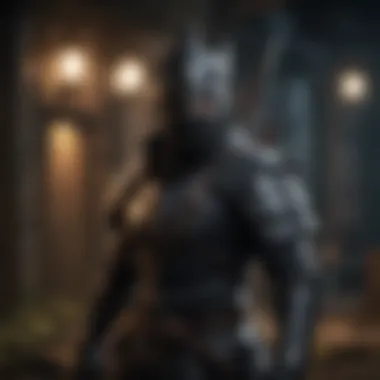Unveiling the Enigmatic World of RPG Classes: A Detailed Exploration of Role-Playing Archetypes


Game Feature Spotlight
Role-playing games (RPGs) are a tantalizing realm of fantasy and adventure, populated by a diverse array of character classes each with their own unique abilities and roles. From the stalwart warrior to the enigmatic wizard, RPG classes play a pivotal role in shaping gameplay experiences and immersing players in captivating narratives. Exploring RPG classes is akin to unraveling a tapestry of possibilities, where strategic choices intersect with immersive storytelling to create a dynamic gaming landscape.
Unique Gameplay Mechanics
Delving into the realm of RPG classes unveils a tapestry of unique gameplay mechanics that define the essence of each archetype. Warriors excel in close combat, relying on strength and resilience to overcome foes, while rogues thrive in stealth and cunning, outmaneuvering enemies with finesse. Wizards harness arcane powers to wield devastating spells, shaping the course of battles with eldritch might. Each class presents distinct gameplay opportunities, challenging players to master diverse strategies and tactics to achieve victory.
Art Style and Design
The art style and design of RPG classes are often a reflection of their thematic essence, conveying visual cues that enhance immersion and storytelling. Warriors are depicted clad in formidable armor, exuding strength and valor in their rugged appearance. Wizards emanate an aura of mystique, adorned in intricate robes adorned with arcane symbols that hint at their prodigious powers. Rogues embody stealth and agility, their sleek attire and subtle accents mirroring their elusive nature. These visual details not only enrich the gaming experience but also serve to distinguish each class within the game world.
Storyline and Characters
Within the intricate tapestry of RPG classes, storyline and characters play a crucial role in shaping the immersive narrative experience. The origin stories of each class inject depth and complexity into their backgrounds, offering insights into their motivations and goals. Characters embodying different classes bring unique perspectives and dynamics to the overarching narrative, forging alliances or rivalries that drive the plot forward. The interplay between class-based roles and narrative arcs creates a rich tapestry of storytelling, weaving the player's choices into the fabric of the game world.
In this article, we plunge into the intriguing realm of RPG classes, dissecting their characteristics, roles, and distinctive abilities. Delving into the intricacies of warriors, mages, rogues, and clerics, we uncover the defining features that set each archetype apart in the gaming sphere. This exploration sheds light on the diverse world of role-playing classes, offering a comprehensive understanding of their significance in gameplay.
Understanding RPG Classes
Defining Role-Playing Games
Exploring the essence of role-playing games (RPGs) is crucial to grasping the foundation of character classes in gaming. The specificity of defining RPGs lies in their immersive storytelling and interactive elements, where players assume roles and embark on adventures within fantastical settings. This article illuminates the key characteristic of RPGs – player agency – underscoring the player's ability to shape the narrative through decision-making. The interactive nature of RPGs enhances player engagement, fostering a dynamic and personalized gaming experience.
The Significance of Character Classes
Character classes play a pivotal role in RPGs, offering players predefined roles with distinct abilities and traits. The significance of character classes lies in their capacity to add depth and structure to gameplay, allowing players to embody various archetypes that cater to different playstyles. Each class brings a unique set of skills and strategies, enriching the gaming experience by offering diverse challenges and opportunities for character growth. By choosing a character class, players can tailor their gameplay experience to align with their preferences and strategic inclinations, creating a dynamic and multifaceted gaming environment.
Evolution of RPG Classes
Historical Context
Tracing the historical roots of RPG classes uncovers their evolution over time, reflecting changes in game design and narrative conventions. Historical context informs the development of character classes, illustrating how they have adapted and diversified to meet the evolving demands of gamers. Understanding the historical context of RPG classes provides insights into the trajectory of game development and the enduring appeal of archetypal characters in gaming culture.
Influence of Popular Culture
The influence of popular culture on RPG classes highlights the amalgamation of fantasy tropes and contemporary references in character design. Popular culture shapes the thematic elements and visual aesthetics of character classes, drawing inspiration from literature, film, and folklore. By integrating popular culture references, game developers infuse familiar themes and motifs into RPG classes, enriching the gaming experience with layers of narrative depth and intertextuality.
Warrior Class
The Warrior Class holds a vital role in the realm of RPG gaming. Known for their unparalleled strength and durability, warriors excel in combat scenarios, making them a popular choice for players seeking a frontline role. Their ability to withstand heavy blows and deal significant damage sets them apart on the battlefield. Warriors bring a sense of stability and endurance to any gaming party, crucial for overcoming tough challenges and adversaries.


Traits and Characteristics
Strength and Durability
Discussion on the aspect of Strength and Durability sheds light on the robust nature of warriors. Their exceptional physical prowess allows them to wield heavy weapons effortlessly and power through intense battles. The key characteristic of Strength and Durability lies in the warrior's capacity to act as a shield for their allies, absorbing damage and drawing enemy focus. This trait is highly beneficial in team-based gameplay, providing a reliable and sturdy frontline presence. However, the reliance on physical strength may sometimes lead to vulnerabilities in more nuanced encounters, requiring strategic positioning and support.
Proficiency with Weapons
Proficiency with Weapons defines the warrior's mastery in utilizing various arms effectively. Warriors boast a wide range of weapon skills, from swords to axes, ensuring versatility in combat engagements. The key characteristic of this trait is the precision and impact warriors deliver with each strike, making them formidable adversaries. Their adeptness with weapons not only enhances their offensive capabilities but also grants them a tactical edge in diverse fighting scenarios. While being skilled with weapons elevates their combat effectiveness, warriors may face limitations in handling magic-based threats or long-range combat situations.
Notable Warrior Subclasses
Berserker
The Berserker subclass exemplifies the ferocity and unrestrained aggression of warriors in battle. Known for their berserk rage and heightened damage output, Berserkers thrive in chaotic confrontations, overwhelming foes with relentless assaults. The key characteristic of Berserkers is their ability to unleash devastating attacks, turning the tide of battles in their favor. This aggressive playstyle attracts players seeking a high-risk, high-reward combat experience. However, the downside of this intense approach includes reduced defenses and susceptibility to crowd control tactics.
Paladin
Paladins represent the epitome of honor and righteousness within the warrior class. Combining martial prowess with divine blessings, Paladins serve as beacons of protection and healing on the battlefield. Their key characteristic lies in their versatility, being adept at offense, defense, and support roles. Paladins offer a balanced gameplay experience, excelling in aiding teammates while standing firm against adversaries. The unique feature of Paladins is their ability to smite evil forces and inspire allies through charismatic leadership. Despite their well-rounded abilities, Paladins may face challenges in adapting to specialized combat situations that demand extreme aggression or subterfuge.
Knight
Knights epitomize chivalry and strategic finesse among warriors, emphasizing defense and tactical superiority. Clad in heavy armor and wielding shields, Knights excel in protecting their allies and holding crucial positions on the battlefield. The key characteristic of Knights is their ability to mitigate incoming damage and provide a resilient front line for their team. Their unique feature lies in employing disciplined combat tactics, utilizing formations to outmaneuver opponents. This defensive playstyle offers stability and control in chaotic encounters, ensuring team survival. However, Knights may encounter difficulties against swift or evasive foes who exploit their lack of mobility for tactical advantage.
Mage Class
The Mage Class holds a pivotal role in the RPG archetype spectrum, contributing unique magical abilities and strategic depth to gameplay. Mages are revered for their mastery over arcane energies and spellcasting prowess, making them indispensable assets in any adventuring party. Their versatile skill set allows players to harness the forces of nature and summon mighty spells to overcome challenges and foes with finesse.
Magical Abilities
Elemental Manipulation
Elemental Manipulation is a cornerstone of Mage abilities, allowing wielders to control and shape natural elements such as fire, water, earth, and air. This aspect of magic grants Mages the power to unleash devastating attacks or manipulate their surroundings for tactical advantage. The key characteristic of Elemental Manipulation lies in its adaptive nature, as Mages can tailor their spells to exploit enemy weaknesses or bolster their allies. While Elemental Manipulation offers great offensive and defensive capabilities, its reliance on environmental conditions can pose challenges in certain scenarios.
Summoning Spells
Summoning Spells augment the Mage's repertoire by enabling them to call forth creatures, spirits, or entities to aid them in battle. These spells provide additional strategic options, from summoning minions to distract enemies to conjuring powerful allies to turn the tide of combat. The key feature of Summoning Spells lies in their versatility, offering Mages flexibility in adapting to diverse encounters and party compositions. However, the complexity of managing summoned beings and their interactions with the battlefield can present risks and require careful planning.
Variants of Mages
Sorcerer


The Sorcerer branch of Mages emphasizes innate magical talent and spontaneous spellcasting, relying on raw arcane power rather than learned knowledge. Sorcerers possess a natural affinity for magic, manifesting mystical abilities through sheer force of will. This unique feature grants Sorcerers a dynamic approach to spellcasting, allowing for quick adaptability and potent spell effects without extensive preparation. While their unparalleled magical potential is a boon, the limited variety of spells known to Sorcerers can constrain their strategic options in prolonged conflicts.
Wizard
Wizards stand out for their studious dedication to mastering the intricacies of spellcraft and magical lore. These practitioners of the arcane arts adhere to spellbooks and formulaic incantations, meticulously researching and expanding their magical repertoire over time. The key characteristic of Wizards lies in their vast spell knowledge and ability to specialize in specific schools of magic, granting them unmatched depth in spellcasting versatility. Despite their scholarly expertise, Wizards' reliance on spell preparation and material components can hinder their effectiveness in spontaneous or chaotic situations.
Necromancer
Necromancers delve into the forbidden realms of death magic, manipulating the forces of life and death to achieve their dark desires. These sinister spellcasters command legions of undead minions and possess macabre abilities to drain life force or instill fear in their adversaries. The unique feature of Necromancers lies in their mastery of necrotic energies, allowing them to wield curses and decay to devastating effect. However, their affinity for death magic can alienate allies and draw unwanted attention from virtuous forces, posing moral dilemmas and social challenges in cooperative gameplay.
Rogue Class
In our quest through the multifaceted realm of RPG classes, delving into the Rogue Class is a pivotal juncture. The Rogue brings a blend of versatility and cunning strategies to the gaming landscape, mirroring the intricate dance of light and shadow. A Rogue's skills in Stealth and Cunning elevate gameplay by adding layers of intrigue and strategic depth. Their ability to navigate treacherous terrains unseen and outwit adversaries make them valuable assets in any adventuring party.
Stealth and Cunning
Dexterity and Agility
The cornerstone of a Rogue's prowess lies in their Dexterity and Agility. These traits empower Rogues to move swiftly and discreetly, weaving through obstacles with finesse. Dexterity enhances their combat prowess, allowing them to strike swiftly and evade enemy attacks with grace. Agility, on the other hand, grants Rogues unmatched reflexes, enabling them to react swiftly to any threat. This dynamic blend of Dexterity and Agility sets Rogues apart, making them formidable foes and invaluable allies in challenging encounters.
Trickery and Deception
At the heart of a Rogue's repertoire are the arts of Trickery and Deception. Rogues excel in manipulating circumstances to their advantage, outsmarting opponents through clever schemes and illusions. The strategic use of misdirection and subterfuge allows Rogues to turn the tide of battle in their favor. Their expertise in deceiving enemies and unraveling mysteries adds an element of intrigue to any gameplay scenario. While Trickery and Deception bestow Rogues with a tactical edge, they also require finesse and precision to wield effectively.
Specialized Rogue Roles
Assassin
Within the realm of specialized Rogue roles, the Assassin stands as a silent harbinger of doom. Masters of infiltration and elimination, Assassins excel in dealing lethal blows with deadly precision. Their ability to strike swiftly and vanish without a trace makes them formidable adversaries on the battlefield. The Assassin's toolkit of poisons, traps, and assassination techniques adds a layer of complexity to their gameplay, appealing to those who prefer a high-risk, high-reward playstyle.
Thief
The Thief embodies the essence of larceny and subterfuge, excelling in the art of acquiring the unattainable. Masters of sleight of hand and lockpicking, Thieves navigate the shadows effortlessly, securing valuable treasures with deft fingers and quick wits. Their nimble fingers and keen senses make them adept at bypassing security measures and uncovering hidden secrets. The Thief's unparalleled skill in acquiring wealth and information makes them indispensable assets in any heist or espionage mission.
Arcane Trickster
Blending the mystical arts with the art of subterfuge, the Arcane Trickster is a mesmerizing enigma on the battlefield. Harnessing both arcane spells and rogue abilities, Arcane Tricksters wield a unique blend of magic and mischief. Their spells seamlessly complement their rogue skills, allowing them to confound enemies with illusions and manipulate reality itself. The unconventional nature of the Arcane Trickster's abilities challenges players to think creatively, merging magical prowess with stealthy tactics for unparalleled versatility and unpredictability.
Cleric Class
In the realm of role-playing games, the Cleric class stands out as a pivotal and indispensable archetype, bringing a unique blend of divine powers and strategic support to the gaming table. Clerics are revered for their versatility in combat, adept healing abilities, and profound connections to higher powers. Their presence in any adventuring party ensures a balanced and efficient progression through challenging quests. Not only are Clerics renowned for their healing prowess, but they also excel in providing crucial buffs and protections to their allies, making them a cornerstone of successful gameplay experiences.


Divine Powers
Healing Abilities
Healing abilities are at the core of a Cleric's skill set, offering invaluable support in the heat of battle. Clerics have mastered the art of rejuvenation, from minor mending spells to potent resurrective magic. The ability to restore health and vitality to wounded allies can turn the tide of a dire situation, ensuring the party's continued success. Clerics' proficiency in healing not only sustains their comrades but also showcases their selfless dedication to the well-being of others.
Channeling Deity's Blessings
The channeling of deity's blessings encapsulates the essence of Clerics' divine connection, enabling them to wield extraordinary powers in alignment with their chosen deity. Through this channeling, Clerics become conduits of divine energy, manifesting miraculous effects according to the will of their gods. This unique feature distinguishes Clerics as divine agents, capable of calling upon celestial intervention to shield their allies, smite their foes, or bring about miraculous transformations on the battlefield.
Domains of Influence
The Cleric class encompasses a variety of domains, each representing a distinct aspect of divine influence and power. These domains shape a Cleric's abilities, defining their strengths and focus within the divine pantheon. Whether devoted to the healing arts of the Life Domain, the elemental fury of the Tempest Domain, or the bountiful forces of the Nature Domain, Clerics draw their powers from these domains to fulfill their sacred duties and champion their beliefs.
Life Domain
The Life Domain embodies the essence of vitality and rejuvenation, empowering Clerics with potent healing capabilities and protective wards. Clerics aligned with the Life Domain excel in sustaining their allies in combat, ensuring their endurance and resilience amidst perilous encounters. By harnessing the life-giving forces of this domain, Clerics become beacons of hope and restoration, embodying the benevolent aspects of divine grace and mercy.
Tempest Domain
The Tempest Domain harnesses the fury of storms and lightning, granting Clerics command over elemental forces of destruction and control. Armed with thunderous spells and tempestuous blessings, Clerics of this domain unleash devastation upon their enemies while safeguarding their allies from the ravages of natural calamities. The Tempest Domain exemplifies raw power and unbridled force, making its adherents formidable combatants and guardians against the elements.
Nature Domain
Clerics attuned to the Nature Domain commune with the spirits of the natural world, wielding powers over flora, fauna, and the primal elements. Through this intrinsic connection to nature, Clerics gain insights into the balance of ecosystems and the inherent wisdom of the earth. By embracing the cyclical nature of life and growth, Clerics of the Nature Domain exemplify harmony and symbiosis, using their abilities to heal, protect, and commune with the wilds for the betterment of all.
Conclusion
In this guide delving into RPG classes, the Conclusion section serves as a crucial component in wrapping up the nuances explored in the various archetypes. Understanding the Diversity in RPG Classes and their Impact on Gameplay is key to appreciating the depth and complexity of role-playing games. As players immerse themselves in the gaming realm, the Conclusion acts as a hub where all insights converge, emphasizing the significance of strategic planning, character development, and team dynamics in shaping their interactive experiences. By reflecting on the interplay between different classes and their unique abilities, gamers can enhance their understanding of how each choice impacts their gameplay tactics and overall satisfaction.
Diversity in RPG Classes
Role-Playing Flexibility
Delving into the realm of Role-Playing Flexibility, one encounters a pivotal aspect that shapes the essence of RPG gaming. The ability to adapt, improvise, and mold characters based on ever-evolving scenarios underscores the versatility required in navigating diverse gaming landscapes. Embracing Role-Playing Flexibility allows players to transcend traditional constraints, fostering a dynamic environment where creativity and ingenuity thrive. While its complexity may pose challenges for newcomers, the allure lies in the endless possibilities it presents for seasoned players seeking novel adventures and immersive storytelling experiences.
Character Development
Character Development stands as a cornerstone of RPG gameplay, unraveling the layers that define an individual's journey within the virtual world. By honing key characteristics, solidifying backstories, and forging relationships with other in-game personas, players craft an engaging narrative that resonates with their personal growth and choices. This meticulous process of character evolution not only enhances immersion but also adds depth to the gaming experience, fostering emotional connections and attachment to the virtual realm. Despite the time investment required, the payoff in terms of enriched gameplay and narrative complexity proves rewarding for those seeking a more profound engagement with their gaming avatars.
Impact on Gameplay
Strategic Planning
Strategic Planning serves as the cornerstone of successful gameplay in RPG scenarios, requiring players to think several steps ahead and consider various outcomes before executing their moves. The meticulous analysis of terrain, adversaries, and resources highlights the importance of foresight and adaptability in overcoming challenges and achieving objectives. While the demand for strategic acumen might intimidate novices, mastering this aspect unlocks a realm of decision-making autonomy and satisfaction that fuels the adrenaline of strategic gamers seeking intellectual stimulation and tactical victories.
Team Dynamics
Within the intricate tapestry of RPG gameplay, Team Dynamics emerge as a vital force that drives collaborative engagement and cohesive success in group-oriented quests. Fostering communication, synergy, and mutual support among team members cultivates a harmonious environment conducive to tackling formidable foes and unraveling complex puzzles. The delicate balance between individual strengths and collective strategies underscores the significance of teamwork, enhancing the social aspect of gaming while promoting camaraderie and shared achievements. Despite the challenges of coordinating disparate playstyles, the rewards of conquering obstacles together far outweigh the trials, fostering memorable experiences and lasting bonds among diverse players in the virtual realm.







